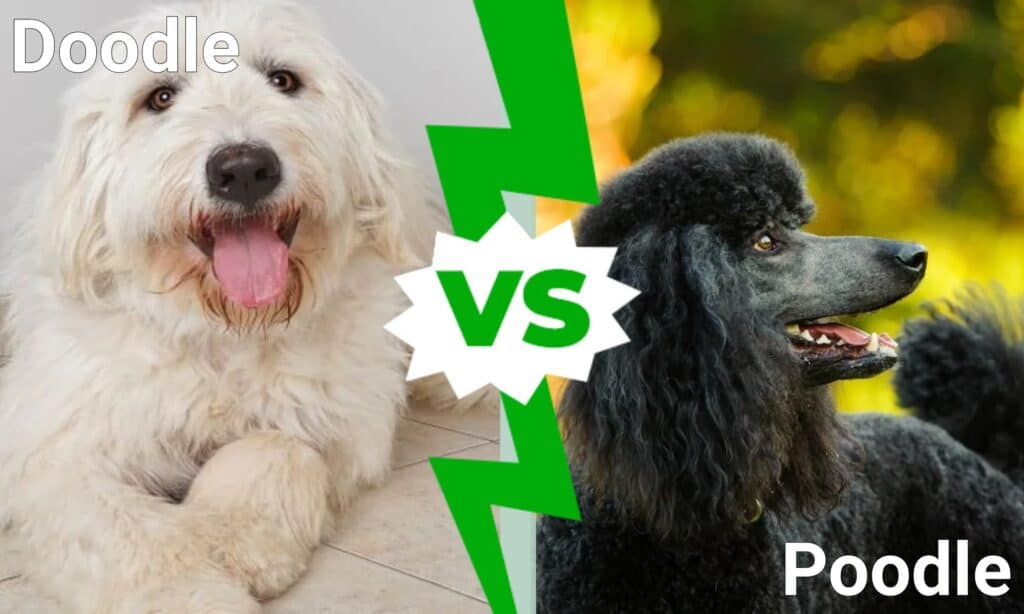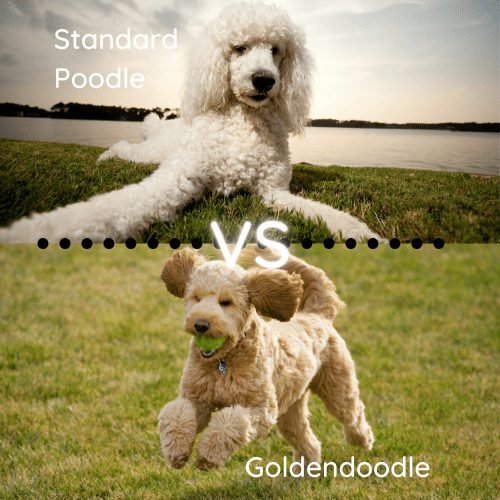When it comes to doodles and poodles, there is often a question of whether they are the same. One might think that they are interchangeable, given their similar names, but there are some key differences between the two.
Doodles are a crossbreed between a poodle and another breed, such as a Golden Retriever or a Labrador Retriever. They are known for their hypoallergenic coats and friendly personalities. On the other hand, poodles are a specific breed on their own, known for their distinctive curly or corded coats. While doodles share some traits with poodles, they also inherit characteristics from their other parent breed, making them unique in their own right.
Doodles and poodles are similar in some ways since doodles are actually a crossbreed of poodles. Both doodles and poodles share similar physical characteristics, such as their curly coats and playful personalities. However, there are some differences between the two. Doodles are a mix of poodles and other breeds, while poodles are a purebred breed. Doodles also tend to have different coat types, depending on the mix, whereas poodles have a consistent coat type. Despite these differences, both doodles and poodles make great family pets.

Understanding the Difference: Doodles vs. Poodles
When it comes to dogs, there are many different breeds to choose from. Two popular and sought-after breeds are doodles and poodles. However, many people often wonder whether doodles and poodles are the same. In this article, we will explore the similarities and differences between these two breeds to help you understand whether doodles and poodles are truly the same or not.
Origins and History
One of the main differences between doodles and poodles lies in their origins and history. Poodles are a well-documented breed that originated in Germany, where they were originally bred as water retrievers. They were highly regarded for their intelligence and ability to work in water. On the other hand, doodles are a relatively newer breed that came into existence through crossbreeding poodles with other breeds such as Golden Retrievers or Labrador Retrievers. The purpose behind creating doodles was to combine the desirable traits of both breeds, such as the poodle’s hypoallergenic coat and the friendly nature of the Retriever breeds.
Physical Characteristics
When it comes to physical characteristics, both poodles and doodles share some similarities but also have distinct differences. Poodles are known for their unique curly or corded coats, which come in various colors such as black, white, brown, and apricot. They have a distinct appearance with long, lean bodies and a prominent topknot on their heads. Doodles, on the other hand, may have coats that resemble those of poodles, but they can also have wavy or straight hair. Their coats come in a wide array of colors, including cream, gold, chocolate, and parti (multi-colored). Doodles have a more “teddy bear-like” appearance, with rounder faces and a stockier build compared to poodles.
Temperament and Personality
Both doodles and poodles are known for their friendly and intelligent nature. Poodles have a reputation for being highly trainable, adaptable, and eager to please their owners. They are often described as being alert, active, and loyal. Doodles, being a crossbreed, inherit the positive traits from their poodle and retriever ancestors. They are typically affectionate, social, and excellent family pets. Doodles are also known for their patient and gentle nature, making them great companions for children and other pets.
Grooming and Maintenance
One significant concern for potential dog owners is the grooming and maintenance required for a particular breed. Poodles are known for their low-shedding, hypoallergenic coat, which requires regular grooming and clipping. Their curly or corded coats need to be brushed, trimmed, and styled to keep them looking their best. Doodles, on the other hand, can have different types of coats depending on their lineage. Some doodles may have non-shedding, low-maintenance coats like poodles, while others may have coats that require more frequent brushing and grooming to prevent matting.
Exercise and Training Needs
Both doodles and poodles are active breeds that require regular exercise and mental stimulation. Poodles, being highly intelligent, thrive on training and activities that challenge their minds. They excel in obedience training, agility, and other canine sports. Doodles, being a mix of poodle and retriever breeds, also need regular exercise to keep them physically and mentally stimulated. They enjoy activities such as fetching, swimming, and walking. It’s important to note that the exercise and training needs of individual doodles may vary depending on their genetics and energy levels.
Health Considerations
Like all breeds, both doodles and poodles can be prone to certain health conditions. Poodles are generally a healthy breed, but they can be susceptible to eye disorders, hip dysplasia, and certain skin conditions. Doodles, being a mixed breed, can inherit health issues from both poodles and their Retriever ancestors. The most common health concerns for doodles include hip dysplasia, elbow dysplasia, and certain genetic disorders prevalent in the parent breeds. It’s important for potential owners to research the health history of the specific doodle or poodle they are considering and choose a reputable breeder who screens for these health conditions.
Popularity and Availability
Poodles have been a popular breed for many years and are well-established in the dog world. They are often seen in various sizes, including standard, miniature, and toy. Doodles, on the other hand, have gained significant popularity in recent years due to their hypoallergenic coats and friendly disposition. They come in different sizes as well, ranging from standard to miniature and smaller-sized doodles. Both poodles and doodles can be found through reputable breeders, rescue organizations, and shelters.
Conclusion
In conclusion, doodles and poodles are not the same, although they share some similarities. Poodles are a distinct breed with a long history, known for their unique coats and intelligence. Doodles, on the other hand, are a newer breed that resulted from crossing poodles with other breeds. They have become popular for their hypoallergenic coats and friendly temperaments. It’s important for potential owners to consider their preferences and lifestyle when deciding between doodles and poodles, taking into account factors such as grooming needs, exercise requirements, and health considerations.
Comparison Table: Doodles vs. Poodles
| Category | Doodles | Poodles |
|---|---|---|
| Origins and History | Newer breed created through crossbreeding | Well-documented breed with a long history |
| Physical Characteristics | Coats can be wavy, curly, or straight Appearance resembles a “teddy bear” |
Distinct curly or corded coats Long, lean bodies with a topknot |
| Temperament and Personality | Affectionate, friendly, and patient | Intelligent, trainable, and loyal |
| Grooming and Maintenance | Coats may require regular brushing and grooming | Regular grooming and clipping needed for curly or corded coats |
| Exercise and Training Needs | Regular exercise and mental stimulation required | Thrives on training and mental challenges |
| Health Considerations | Potential for health issues from both poodles and retrievers | Susceptible to eye disorders, hip dysplasia, and skin conditions |
| Popularity and Availability | Gaining popularity, available through breeders and shelters | Long-established breed, available in various sizes |
Key Takeaways
- Doodles and poodles are not the same, but they share some similarities.
- A doodle is a crossbreed between a poodle and another dog breed.
- Poodles are a specific breed of dog known for their intelligence and hypoallergenic coats.
- Doodles, like Labradoodles and Goldendoodles, are popular for their friendly and playful nature.
- Both doodles and poodles require regular grooming to maintain their coats.
Frequently Asked Questions
Doodles and poodles are both popular breeds of dogs, but they have distinct differences. Here are some common questions about doodles and poodles:
1. What is the difference between a doodle and a poodle?
Doodles are a crossbreed between a poodle and another breed, while poodles are a specific breed. Poodles have a distinct appearance with their signature curly or corded coat, while doodles can have a variety of coat types depending on the breed they are crossed with. Additionally, poodles are recognized by breed-specific organizations, while doodles are not considered an official breed.
However, doodles and poodles share some similarities, such as their intelligence, playful nature, and trainability. Both breeds are also known for their hypoallergenic qualities, making them a popular choice for people with allergies.
2. Are doodles and poodles similar in temperament?
While doodles and poodles can have similar temperaments due to their shared traits, the specific temperament of a dog can vary depending on factors such as genetics, individual upbringing, and socialization. Poodles are known for being highly intelligent, trainable, and eager to please, which are traits that can translate to doodles as well.
However, it’s important to note that doodles are crossbreeds, so their temperament can also be influenced by the other breed involved in the mix. It’s always recommended to meet the individual dog and assess their temperament before making any conclusions about their behavior.
3. Do doodles and poodles have the same grooming needs?
Both doodles and poodles require regular grooming, but the specific needs can vary depending on their coat type. Poodles have a distinct curly or corded coat that requires frequent brushing to prevent matting and regular trimming to maintain the desired appearance.
Doodles, on the other hand, can have different coat types depending on the breed they are crossed with. Some doodles may have a curly or wavy coat similar to poodles, while others may have a straight or wiry coat. The grooming needs of a doodle can therefore vary, but regular brushing, occasional trimming, and proper coat care are generally necessary to keep their coat healthy and free of tangles.
4. Are doodles and poodles prone to the same health issues?
Both doodles and poodles can be prone to certain health issues, but their risk factors can vary. Poodles are generally considered a relatively healthy breed, but they can be prone to conditions such as hip dysplasia, progressive retinal atrophy, and certain skin disorders.
Doodles, being crossbreeds, can inherit health issues from either parent breed. For example, if a doodle is crossed with a breed that is prone to hip dysplasia, the doodle can also be at an increased risk. It’s important for doodle owners to be aware of the potential health issues associated with both parent breeds and work with a reputable breeder who tests their breeding dogs for genetic diseases.
5. Can doodles and poodles be registered with breed-specific organizations?
Poodles are recognized as a specific breed by various kennel clubs and breed-specific organizations, such as the American Kennel Club (AKC) and the United Kennel Club (UKC). They can be registered and participate in events and competitions held by these organizations.
Doodles, however, are not recognized as an official breed by these organizations. Since doodles are crossbreeds, their traits and characteristics can vary widely. While some doodle owners may choose to register their dogs with organizations that accept mixed breeds, it’s important to note that doodles may not be eligible to compete in breed-specific events.

In summary, doodles and poodles are not the same, although they have some similarities. While both are dog breeds, doodles are a hybrid mix of poodles with other breeds, resulting in various combinations. Poodles, on the other hand, are a specific breed known for their intelligence, hypoallergenic coats, and distinctive appearance.
Doodles can inherit traits from poodles, such as intelligence and coat texture, but their appearance and characteristics can vary widely depending on the other breed involved. While poodles have a standardized appearance and temperament, doodles can differ significantly in size, coat type, and personality. Therefore, it is important to research and understand the specific traits and needs of each individual breed before considering a doodle or poodle as a pet.
